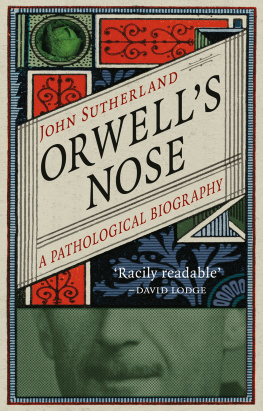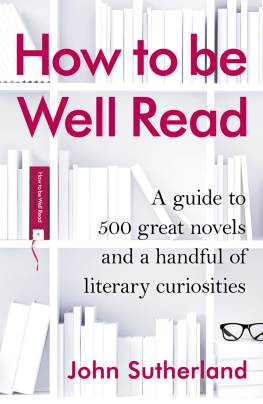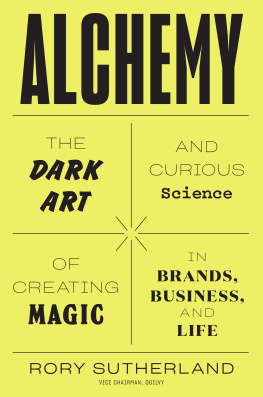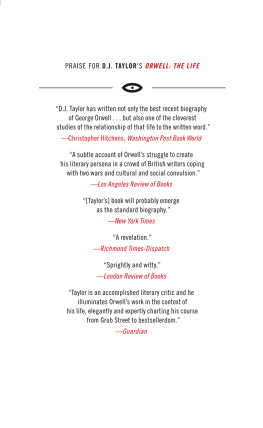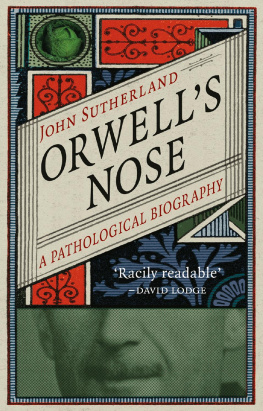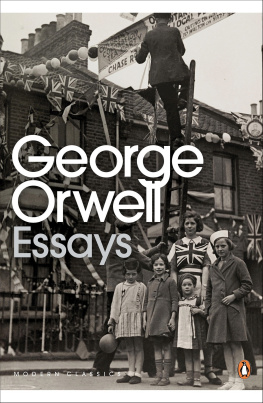ORWELLS NOSE

J OHN S UTHERLAND
ORWELLS
NOSE
A PATHOLOGICAL BIOGRAPHY
REAKTION BOOKS
Published by Reaktion Books Ltd
Unit 32, Waterside
44-48 Wharf Road
London N1 7UX, UK
www.reaktionbooks.co.uk
First published 2016
Copyright John Sutherland 2016
All rights reserved
No part of this publication may be reproduced, stored in a retrieval system, or transmitted, in any form or by any means, electronic, mechanical, photocopying, recording or otherwise, without the prior permission of the publishers
Page references in the Photo Acknowledgements and
Index match the printed edition of this book.
Printed and bound in Great Britain by TJ International, Padstow, Cornwall
A catalogue record for this book is available from the British Library
eISBN: 9781780236964
Contents
I was damned. I had no money, I was weak, I was ugly,
I was unpopular, I had a chronic cough, I was cowardly. I smelt.
ORWELL, about Eric Blair, aetat 8
four frightful words... The lower classes smell.
The Road to Wigan Pier
A NOTE ON NOTES
The most comprehensive information resource is Peter Davisons Complete Works of George Orwell. Davisons twenty-volume work (prohibitively expensive) is hard to come by outside copyright and research libraries. I have access to such a library; many readers will not. For the text that follows I have used, where useful, the four-volume, widely available (Penguin) paperback The Collected Essays, Journalism and Letters of George Orwell (1968), edited by Ian Angus and Sonia Orwell. Its contents are chronological and indexed: dates of composition and first publication are given.
Foreword
In 1928 D. H. Lawrence, as passionate a defender of the English language as Orwell, made his quixotic attempt to liberate (hygienise) a small lexicon of four letter words. The UK finally gave way on the point, in November 1960, at the Old Bailey. I have used a few four-letter words, once (perhaps still in some places) thought offensive. Had he lived fifteen years longer, so, of course, would George Orwell have done.
Preface
Reading with the Nose
It would be hateful if things did not smell: they would not be real.
ADRIAN STOKES
Three years ago, in high hay-fever season, I lost my sense of smell. It has never returned and Im told it never will. Of all the five senses one can expect to part with en route to sans everything, smell is the most dispensable.
And if the Freudians (and Jonathan Swift) are right that civilization is the distance Homo sapiens (Yahoos) puts between his nose and his excrement, I am a more civilized person for living in my organically neutralized world. The 94 per cent of British adult women and 87 per cent of British men who use deodorants daily would perhaps agree. (These figures, taken from the Internet, seem high to those Ive spoken to with the power of smell. Particularly on homeward journeys on the London Tube.)
About the same period that my nasal membranes wilted I had embarked on a reread of Orwell, in the spirit of Janeites who revisit Austens six novels every year, just to relax into the comfort of old literary places. The writings I had known for half a century were, I found, interestingly different. Not quite as comforting. Imagine, for example, a person born with no sense of smell. Would Animal Farm read the same way as for someone with functioning nostrils and long familiarity with the richly mixed but detectably different aromas (cow shit, chicken shit, horse shit, pig shit) in a farmyard? And then, at the end, Napoleon walking past on two legs with what else? an aromatic cigar.
According to Norman Mailer, a fellow connoisseur, with Orwell, of lifes olfactions (or, as Mailer would call them, olfactoids), there aint but three smells in the whole Hemingway oeuvre. Papas fish, to adopt the working-class insult, dont smell. Mailers count, thrown out, as I recall, on the Dick Cavett talk show, was not the result of careful textual examination but nonetheless rings true.
Compare the first three richly scene-setting aromas in Nineteen Eighty-Four. The story opens with Winston Smith escaping the April cold through the glass doors of Victory Mansions. Instant nasal attack: The hallway smelt of boiled cabbage and old rag mats. Having slogged up to his apartment on the seventh floor (the lift, of course, is broken), Winston pours himself a reviving swig of Victory Gin. It gave off a sickly, oily smell, as of Chinese rice-spirit. He smokes a Victory cigarette (no need to describe that acrid smell), and is called to the Parsons flat next door. Can he unplug the sink? begs the harassed mother:
There was the usual boiled-cabbage smell, common to the whole building, but it was shot through by a sharper reek of sweat, which one knew this at the first sniff, though it was hard to say how was the sweat of some person not present at the moment.
You need a nose that a bloodhound would envy to track the perspiratory reek of someone who has been out of the house for hours. Later, in the grim waiting room for the dreaded Room 101 trip, Winston is obliged to smell, at close range, Parsonss shit while it is still warm and at its most odoriferous. Horrible as it is, it is preferable to the smell that awaits Winston in Room 101.
There are many threads in Orwells fiction. But it is interesting to compile their smell narratives. I append one for A Clergymans Daughter, along with the most smell-referential of his non-fiction books, The Road to Wigan Pier. The latter contains the four words that have hung like an albatross around Orwells neck: The working classes smell. The qualifications with which he surrounded the allegation are rarely quoted.
Smell narratives would be as terse as a 140-character tweet with some authors. I asked Deirdre Le Faye, the doyenne of Jane Austen studies and editor of her surviving letters, what smells there were in the six novels. Deirdres reply was interesting and perplexed:
Smell I think is only specifically mentioned in Mansfield Park, with the bad air and bad smells of the Portsmouth house. This does strike me as slightly odd, because by our standards at least, the past must have been a fairly smelly place.
The lady who wrote Sense and Sensibility was, apparently, short of one sense.
What would the ambient smell of Jane Austens outside world have actually been? Easily answered. Inside the house, the communal toilet sand box. Outside, horse droppings, predominantly whether in rural Hampshire or urban Bath. The Regency world moved on four legs. Horses deposit between 7 and 14 kg (15 and 30 lb) of excrement and 9 litres (2 gallons) of urine per day where they will. There is no such beast as a house-trained horse.
Orwell, who claimed he would have preferred to have lived two hundred years ago, with his fellow Tory-anarchist Jonathan Swift, might have found that equine-excremental world more bearable, attractive even, than the world he was born in. He loathed twentieth-century mechanical smells although paraffin (his commonest source of home heating and lighting, when in the country) he found oddly sweet to his nostrils, probably because of its association with warmth and light. More than most twentieth-century authors, he did a lot of reading and writing by tilly lamp, the odoriferous heater meanwhile throwing its mottled pattern onto the ceiling.

